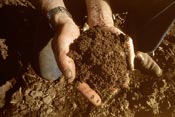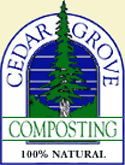What's going on your garden?
by James Burke
This article was originally published in April 2004

(April 2004) — Some people love nothing better than digging in the dirt. And for those who find great joy in the garden, there’s no time like spring. Many gardeners take special pride in using the best fertilizer they can find, knowing they’re enriching the soil while growing their favorite fruits, vegetables and flowers.
People who care about their gardens and lawns want to know what they’re putting on them — just as more and more people are realizing the importance of learning about what they eat and drink.
The trouble is, if you set out to buy fertilizer that’s advertised as “organic” or “100 percent natural,” you might not know what you’re getting. In fact, you could be feeding your garden or lawn something that contains undisclosed and unregulated amounts of hazardous waste.
Lax regulations
As award-winning reporter Duff Wilson pointed out in the Sound Consumer last year, fertilizer is one way people are exposed to toxic contaminants. Regulations are especially lax for the fertilizer industry — even though it churns out about 60 million tons a year worldwide. (See The scoop on organic fertilizer, March 2003, Sound Consumer.) That’s a hefty amount — most of it good for the soil. But the legal practice of “recycling” toxic waste into fertilizer means some products may include elevated levels of “tag-along toxics” from mining waste, pulp residue, or wood and coal ash.
At a time when many people are just beginning to understand the National Organic Standards for food, it’s worth stressing an important point: these standards apply only to food, not to fertilizer and soil amendments for retail sale. On labels for soil amendments, “organic” simply means that the product is carbon-based, and “100 percent natural” means that it isn’t synthetic.
Since fertilizer-makers have to list only the ingredients they advertise, those are the only ingredients that get checked.
“You’re guaranteed a certain level of nitrogen, phosphorous, iron and zinc,” Wilson observed. “But what else is in the bag? In most states, nobody controls it and nobody tells consumers.”

A different approach
PCC, however, offers a choice you can trust. We carry a line of products from Cedar Grove Composting, a Washington-based company that takes a truly all-natural approach to compost, which can help people make enlightened choices about what they give back to the earth. Since opening its Maple Valley plant in 1989, the company has grown into one of the country’s largest commercial composting facilities, with plans for a second plant in Everett to open later this year.
Composting is a natural cycle in which tiny organisms break down organic material loaded with nitrogen and carbon — things like grass, plant cuttings, dried leaves and manures — into a dark, crumbly substance with an earthy odor. When used properly, it replenishes organic nutrients in the soil, reduces erosion and water run-off, and strengthens plants so they’re naturally more resistant to pests and disease.
Cedar Grove has blossomed because it delivers on its promise to provide all-natural compost, with no animal waste, sludge waste or other amendments added. It won’t pollute the soil and is safe around children and pets. Cedar Grove compost is certified organic under the Washington State Department of Agriculture Organic Food Program.
The company provides a full range of products, including potting soil, premium topsoil and a bulb mix. Its “Cedar Grove Tea,” which improves soil quality and reduces the need for synthetic fertilizers, is an additive-free, concentrated liquid extract made from the company’s brand of compost.
Another plus: unlike fertilizer, compost is regulated and must meet state standards for heavy metals, nitrogen content, pH level, E. coli and salmonella, among others. In the last few years, some commercial compost was found to be contaminated with an herbicide called clopyralid. Last year, the state Department of Agriculture instituted use restrictions on the pesticide to keep it out of most compost. This year’s data on compost samples show that clopyralid levels have dropped precipitously. Cedar Grove tests its compost specifically for clopyralid to ensure quality.
The result is a product that’s good for your lawn or garden and won’t harm the people or animals around you.
Not all PCC stores carry Cedar Grove products, so check your area store for availability. For more on Cedar Grove products, see www.cedar-grove.com.
